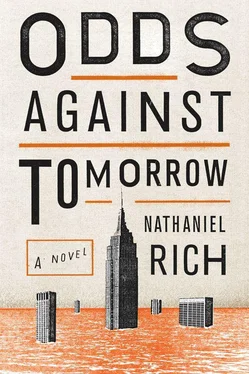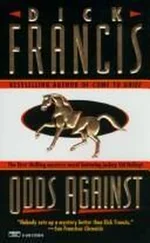He then turned to public health scares: the mass production of tainted meats; the poisoning of the water supply; a gas explosion in the sewers; an airborne toxin that escapes from a chemical factory on a windless day and floats into a major city; an explosion at a nuclear power plant, such as Indian Point, just thirty-five miles from New York. Indian Point sat on the intersection of two active seismic zones — a fact that was not known when the plant was built in 1962. Then there was the possibility of a pandemic. It would originate in Asia, perhaps Thailand. A little girl who tends the chickens on her family farm wakes up with a fever and a headache. The next day she can barely move; by evening she has developed a painful cough, vomits blood. The desperate parents roll her in a wheelbarrow to the nearest hospital, where X-rays show a shadowy white mass, about the size of a penny, in one of her lungs. The girl dies, horribly, two days later, but not before she has sprayed billions of viral particles into the air around her. Hospital workers carry the disease home to their families and transmit it to fellow commuters on the public buses. A few days after that a woman boards an airplane at Suvarnabhumi Airport headed for San Francisco. She has a headache and a mild sore throat. Within two weeks, sixty million people are dead.
Mitchell segued gracefully into a special feature on terrorism: attack by post; bombing by shoe, suitcase, or truck; air attack; attack by radioactive agent; suicide bombings on Fifth Avenue and Wall Street. A cyberattack releases the account numbers, passwords, and holdings of the clients of a major international bank. A cyberattack reveals corruption in the Supreme Court. A cyberattack launches bombs (see War, above).
Then earthquakes, floods, wildfires, and tsunamis. He learned that scientists had detected fault lines in a five-mile-wide volcano situated on La Palma, one of the westward Canary Islands. When an eruption causes the crater, and its half-trillion tons of rock, to break apart and slide into the ocean — and this is a geological inevitability, only a matter of time — it will trigger the largest tsunami in recorded history. The great wave will travel across the ocean faster than an airplane. It will take eight hours to reach the Atlantic Seaboard, by which time the crest will be half a mile above sea level — more than twice the height of the Empire State Building. And then that wave will crash.
There were also the threats of a solar storm that would reset the planet’s magnetic field, a deep freeze, hailstorm, hurricane, tornado, asteroid, volcano.
“There is no volcano in New York City,” said Nybuster.
“That’s what you’d like to believe,” replied Mitchell. “You would like to believe that very much.”
A few sessions — a reprieve, really — on minimal, localized assaults: employee sabotages company’s finances; employee leaks industry secrets to competition; employee blows his brains out at his desk; employee goes on office-wide shooting rampage. A gun is fired in the United Nations. Sarin gas is released into the subway system. An aqueduct that supplies drinking water to the city is poisoned. The complications he explored were extravagantly detailed, tendinous, delicious.
Finally, large-scale fiscal fiasco: the dollar collapses; a major foreign currency fluctuates violently; the real estate market slides eighty percent; the World Bank files for bankruptcy; commodities soar, leading to food riots and political instability. And peak oil millenarianism: electric grid crash; the collapse of industrial agriculture, travel, and international trade; a return to premodern agrarian life; mass starvation; the wilding of the suburbs.
So Elsa, tell me, how’s that for the “actual world”?
* * *
The research came easily enough, but Mitchell struggled to prepare scripts for his presentations. Before each meeting, misshapen blocks of facts drifted through his mind with jagged edges that never properly aligned. He glanced at his notebook and found nothing but disarranged sentences and abandoned phrases, with no logical progression between them. It was only when he began to speak, his clients struggling to determine the veracity of what he was saying, that he could truly visualize the horrors he was paid to predict. His eyes would float faraway and water slightly, and a Cassandra prophecy would unfold in full paragraphs. Occasionally he thought of the street preachers on the busy midtown corners spouting revelation fantasy — and felt momentarily sick. But he forced himself to remember that with him it wasn’t phony spiritualism. It wasn’t an act. It was more like a feat of transference.
He was visiting the place he often went at night, after the cockroaches stopped scurrying up the walls of his stomach and he shuddered into a restless semiconsciousness. It was a nightmare city, a phobopolis. It came to him in a blur of flashing metal and glass. The chaotic anxiety of his bullet-train dreams would abate, like the players of an orchestra finishing their tuning exercises just before the theater lights dim, and he’d find himself in a silent, glass-windowed apartment. He was high off the ground, so high that he couldn’t see the bases of the other skyscrapers. The sky was a rich, bright blue and the enormous steel edifices soared both as high and as low as he could see. He suspected that the towers never stopped, but extended infinitely in either direction. They were slender, the towers, and they swayed lightly. In the windows of the other skyscrapers stood people, peering out, just like him.
He found it calming, during consultation meetings, to imagine that his clients were the skyscraper dwellers from his dreams, staring forlornly from their glass windows, emasculated by anxiety. Seeing them there, imprisoned in their identical white rooms and looking back at him with straining eyes, Mitchell regained his nerve and began to speak about what would happen when disaster struck.
It also helped when they sweated. Whenever Mitchell held client meetings in his office, Charnoble turned the thermostat five degrees higher — just warm enough for beads of perspiration to appear beneath collars and in armpits, but not enough to make it plainly uncomfortable. After all, it was always at least twenty degrees warmer outside. It had been a savage, unusually arid summer, and the heat was getting into the brain. It had begun to appear on the release forms filled out by prospective FutureWorld clients. When asked for the most immediate challenges to the health of their business, two different representatives — from a perfume company and a firm that manufactured artificial sweeteners — had cited “catastrophic drought.” It had been a slow summer for news, and the tabloids trumpeted stories that normally wouldn’t have received front-page headlines. The city had been spared blackouts, but during a particularly strong heat wave in July, when the temperature hit 106, cars broke down in the streets and city workers watered the George Washington Bridge with fire hoses to prevent it from locking when its plates expanded. The Delaware and Catskill reservoir systems were in danger of emptying, and boil-water advisories were issued on the worst days. Plant watering was discouraged; bottled water was hoarded. The streets became strangely quiet. The Department of Health and Public Hygiene issued statements advising New Yorkers to “Slow Down” and “Think Cool Thoughts.” At John Day High School a fifteen-year-old football player, after being denied a water break by his coach, sat down Indian-style on the fifty-yard line and expired. The coach was charged with manslaughter. (Mitchell suspected Brugada.) In Ridgewood, the corpses of Harold and Caroline Crowder, who had been married more than sixty years, were found in an elevator that had become stuck between the first and second floor of their home. The excessive heat in the steel box had melted their kidneys.
Читать дальше












